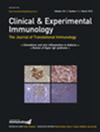NK 样 CD8 T 细胞:适应性记忆与先天性免疫之间的一个潜在进化连续体。
IF 3.4
3区 医学
Q3 IMMUNOLOGY
引用次数: 0
摘要
CD8 T 细胞是重要的适应性免疫细胞,具有细胞毒性,可通过主要组织相容性复合体 I 类依赖性引物途径对抗病原体或异常自身细胞。记忆 CD8 T 细胞池的组成受多种因素影响。生理衰老、慢性病毒感染和自身免疫性疾病会促进具有高度分化记忆表型的 CD8 T 细胞的积累。不断积累的研究表明,其中一些记忆性 CD8 T 细胞还表现出先天性细胞毒性,并上调与自然杀伤(NK)细胞相关的受体的表达。进一步的分析表明,这些 NK 样 CD8 T 细胞具有 NK 和 CD8 T 细胞的转录特征,表明 CD8 T 细胞已转化为 NK 细胞。然而,NK样转化的具体诱导机制以及这一过程对CD8 T细胞的影响仍不清楚。本综述旨在推断 NK 样 CD8 T 细胞可能的分化模式,总结这些细胞上表达的主要 NK 细胞受体的功能,并为探索这些 CD8 T 细胞在健康和疾病中的作用提供一个新的视角。本文章由计算机程序翻译,如有差异,请以英文原文为准。
NK-like CD8 T Cell: One Potential Evolutionary Continuum between Adaptive Memory and Innate Immunity.
CD8 T cells are crucial adaptive immune cells with cytotoxicity to fight against pathogens or abnormal self-cells via major histocompatibility complex class I-dependent priming pathways. The composition of the memory CD8 T cell pool is influenced by various factors. Physiological aging, chronic viral infection, and autoimmune diseases promote the accumulation of CD8 T cells with highly differentiated memory phenotypes. Accumulating studies have shown that some of these memory CD8 T cells also exhibit innate-like cytotoxicity and upregulate the expression of receptors associated with natural killer (NK) cells. Further analysis shows that these NK-like CD8 T cells have transcriptional profiles of both NK and CD8 T cells, suggesting the transformation of CD8 T cells into NK cells. However, the specific induction mechanism underlying NK-like transformation and the implications of this process for CD8 T cells are still unclear. This review aimed to deduce the possible differentiation model of NK-like CD8 T cells, summarize the functions of major NK cell receptors expressed on these cells and provide a new perspective for exploring the role of these CD8 T cells in health and disease.
求助全文
通过发布文献求助,成功后即可免费获取论文全文。
去求助
来源期刊
CiteScore
8.40
自引率
2.20%
发文量
101
审稿时长
3-8 weeks
期刊介绍:
Clinical & Experimental Immunology (established in 1966) is an authoritative international journal publishing high-quality research studies in translational and clinical immunology that have the potential to transform our understanding of the immunopathology of human disease and/or change clinical practice.
The journal is focused on translational and clinical immunology and is among the foremost journals in this field, attracting high-quality papers from across the world. Translation is viewed as a process of applying ideas, insights and discoveries generated through scientific studies to the treatment, prevention or diagnosis of human disease. Clinical immunology has evolved as a field to encompass the application of state-of-the-art technologies such as next-generation sequencing, metagenomics and high-dimensional phenotyping to understand mechanisms that govern the outcomes of clinical trials.

 求助内容:
求助内容: 应助结果提醒方式:
应助结果提醒方式:


